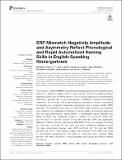ERP Mismatch Negativity Amplitude and Asymmetry Reflect Phonological and Rapid Automatized Naming Skills in English-Speaking Kindergartners
Author(s)
Norton, Elizabeth S; Beach, Sara D; Eddy, Marianna D; McWeeny, Sean; Ozernov-Palchik, Ola; Gaab, Nadine; Gabrieli, John DE; ... Show more Show less
DownloadPublished version (2.642Mb)
Publisher with Creative Commons License
Publisher with Creative Commons License
Creative Commons Attribution
Terms of use
Metadata
Show full item recordAbstract
<jats:p>The mismatch negativity (MMN), an electrophysiological response to an oddball auditory stimulus, is related to reading ability in many studies. There are conflicting findings regarding exactly how the MMN relates to risk or actual diagnosis of dyslexia/reading impairment, perhaps due to the heterogeneity of abilities in children with reading impairment. In this study, 166 English-speaking kindergarten children oversampled for dyslexia risk completed behavioral assessments and a speech-syllable MMN paradigm. We examined how early and late MMN mean amplitude and laterality were related to two established predictors of reading ability: phonological awareness (PA) and rapid automatized naming (RAN). In bootstrapped group analyses, late MMN amplitude was significantly greater in children with typical PA ability than low PA ability. In contrast, laterality of the early and late MMN was significantly different in children with low versus typical RAN ability. Continuous analyses controlling for child age, non-verbal IQ, and letter and word identification abilities showed the same associations between late MMN amplitude with PA and late MMN laterality with RAN. These findings suggest that amplitude of the MMN may relate to phonological representations and ability to manipulate them, whereas MMN laterality may reflect differences in brain processes that support automaticity needed for reading.</jats:p>
Date issued
2021Department
McGovern Institute for Brain Research at MIT; Massachusetts Institute of Technology. Department of Brain and Cognitive Sciences; Massachusetts Institute of Technology. Institute for Medical Engineering & ScienceJournal
Frontiers in Human Neuroscience
Publisher
Frontiers Media SA